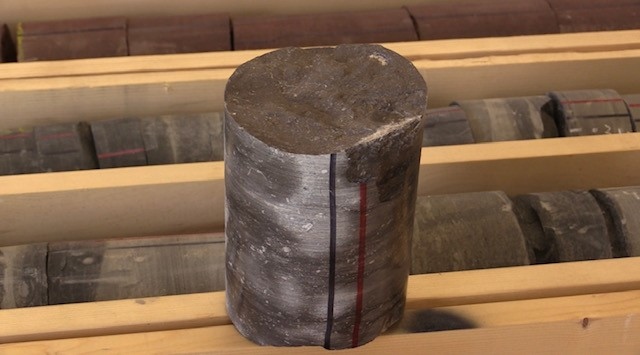Billion-year-old rock unearthed in Ontario in search for nuclear waste storage site
 Borehole rock deposit taken from Teeswater area drilling for potential nuclear waste site in October, 2021. (Scott Miller / CTV News)
Borehole rock deposit taken from Teeswater area drilling for potential nuclear waste site in October, 2021. (Scott Miller / CTV News)
Martin Sykes holds some very special rocks in his hands inside a work trailer near Teeswater, Ont., the potential site of Canada’s first permanent underground storage facility for nuclear waste.
“It’s incredibly exciting to see these rocks coming out the ground, right here in South Bruce. Some of these rocks are 400 to 450 million years old. At the bottom of the borehole, over one billion years old,” said Sykes, the senior geoscientist with the Nuclear Waste Management Organization (NWMO).
But the rocks that Sykes and the NWMO really care about are the Cobourg deposits. This is the rock formation they plan to build a 1,500-acre underground facility in — to house all of Canada’s most radioactive nuclear waste.
“The target formation, the Cobourg, which would be the formation used for the repository itself, that was found at 650 metres deep. So we were able to confirm where we expected to see it,” Sykes explained.
Just up Concession 8 in South Bruce, a second borehole site is underway and the NWMO says the goal is to be able to let the public know whether the rock north of Teeswater can support the massive underground storage facility, meant to contain 5.5 million used nuclear fuel bundles by late 2022 or early 2023.
That timing is important, because citizens opposing the underground plan want a community referendum on the project be put on the ballot for next October’s municipal election.
“Since this project will have a tremendous effect on our community, it is necessary for us to get all the information put forward to the public so that the public can decide on whether they want to host this in our community, or not,” said Municipality of South Bruce Mayor Robert Buckle.
According to Sykes, testing of the how the water moves within their potential project site will continue through next year, along with the borehole testing, which should wrap up in about eight months.
“We’re looking at spring next year for the end of borehole site to site activities,” he said.
That will no doubt coincide with a heightened debate in the community on how best to decide whether or not the Teeswater area in Bruce County wants to house Canada’s high-level nuclear waste.
The NWMO wants to decide some time in 2023 whether South Bruce or Ignace, in Northern Ontario, will host the $23-billion project.
CTVNews.ca Top Stories

Montreal man died of aneurysm after waiting 6 hours in ER
A 39-year-old Montreal man died of an aneurysm after spending six hours in an emergency room before giving up and going home.
Landslide closes B.C.'s Sea to Sky Highway; reception centre opened for stranded travellers
A landslide shut down the Sea to Sky Highway in both directions near Lions Bay Saturday morning, and authorities expected the road to remain closed for at least the rest of the day.
'We called a Code Silver': LHSC goes into lockdown after shooting outside emergency department
The emergency department (ED) doors at LHSC Victoria Campus were being repaired Saturday morning after a person fired a gun into the glass.
Canada Post union negotiator balks at labour minister's calling for a 'time-out'
This week, Labour Minister Steven MacKinnon announced a 'time-out' in the ongoing Canada Post strike. In a way, Canadian Union of Postal Workers (CUPW) negotiator Jim Gallant says he agrees with that phrasing.
ABC agrees to give US$15 million to Donald Trump's presidential library to settle defamation lawsuit
ABC News has agreed to pay US$15 million toward Donald Trump’s U.S. presidential library to settle a lawsuit over an inaccurate on-air assertion that the president-elect had been found civilly liable for rape.
YouTube singer arrested in Iran after performing an online concert while not wearing a hijab
Iranian authorities have arrested a female singer who performed a virtual concert on YouTube, a lawyer said.
British departure means uncertain future for Alberta's massive Suffield military base
A sprawling military training base more than twice the size of New York City in southeastern Alberta appears to be a shadow of its former self while its future use remains up in the air.
Enbridge pipeline spills 70,000 gallons of oil in Wisconsin
Roughly 70000 gallons (264,978 litres) of oil from a pipeline spilled into the ground in Wisconsin, officials said.
Woman accusing Jay-Z and Sean 'Diddy' Combs of sexual assault acknowledges inconsistencies
A woman accusing rappers Jay-Z and Sean “Diddy” Combs of sexually assaulting her when she was 13 has acknowledged certain inconsistencies in her story.





























